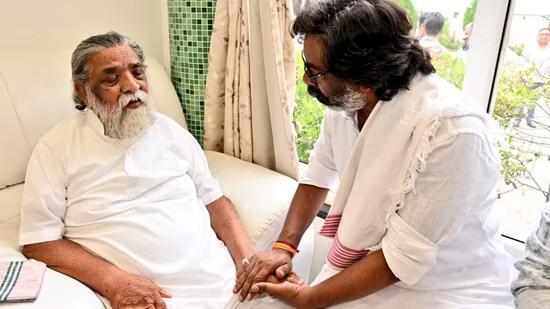
Who was Shibu Soren, Jharkhand’s former CM who passed away?
Shibu Soren, the founder of Jharkhand Mukti Morcha (JMM), passed away on Monday at the age of 81, leaving behind a legacy of fighting for the rights of tribals in Jharkhand. Throughout his political career, Soren served as the Chief Minister of Jharkhand three times until 2010, but unfortunately, he could not complete a full term even once. Despite this, he remained a prominent figure in Jharkhand’s politics, earning the nickname “Dishom Guru” or “leader of the land”. His son, Hemant Soren, is currently serving as the Chief Minister of Jharkhand.
Born on February 11, 1941, in Chaibasa, Jharkhand, Soren’s early life was marked by struggles and challenges. He was forced to drop out of school due to financial constraints and had to work as a laborer to support his family. However, this early struggle only fueled his determination to fight for the rights of the marginalized and the oppressed.
Soren’s political journey began in the 1970s when he joined the Jharkhand Mukti Morcha (JMM), a party fighting for the separation of Jharkhand from Bihar. He quickly rose through the ranks, becoming one of the party’s top leaders. In 1977, he was elected to the Bihar Legislative Assembly and served as the Deputy Speaker.
In 1980, Soren became the JMM’s president, and his leadership played a crucial role in the party’s growth and success. His advocacy for tribal rights and his commitment to fighting against the exploitation of tribals resonated deeply with the people of Jharkhand. This earned him the respect and admiration of the tribal communities, who saw him as a champion of their cause.
Soren’s first stint as Chief Minister was in 1989, when the JMM formed a government in partnership with the Indian National Congress (INC). However, his government lasted only for a short period of 16 days before it was toppled by the INC. Despite this setback, Soren continued to play a key role in Jharkhand’s politics, serving as the leader of the opposition in the state assembly.
In 2000, Soren returned to power, this time as the Chief Minister of the newly created state of Jharkhand. He formed a government with the support of the INC and the Rashtriya Janata Dal (RJD). However, his government faced numerous challenges, including corruption allegations and disagreements with his coalition partners. As a result, he was forced to resign in 2003.
Soren’s third and final stint as Chief Minister was in 2005, when he formed a government with the support of the INC and the Bharatiya Janata Party (BJP). However, this government too was short-lived, lasting only for a year before it was toppled by the INC.
Despite his multiple stints as Chief Minister, Soren’s inability to complete a full term has been a subject of criticism. However, his commitment to fighting for tribal rights and his unwavering dedication to the people of Jharkhand remain unparalleled. His legacy is a testament to the power of determination and the importance of fighting for the rights of the marginalized.
Soren’s passing away has been met with widespread tributes and condolences from across the country. His son, Hemant Soren, who is currently serving as the Chief Minister of Jharkhand, has vowed to continue his father’s legacy and fight for the rights of the tribals.
In conclusion, Shibu Soren was a true leader who dedicated his life to fighting for the rights of the marginalized and the oppressed. His legacy will continue to inspire generations to come, and his commitment to tribal rights will remain a beacon of hope for those who are fighting for their rights.






